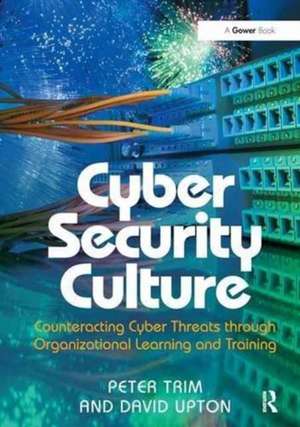Cyber Security Culture: Counteracting Cyber Threats through Organizational Learning and Training
Autor Peter Trim, David Uptonen Limba Engleză Paperback – 16 noi 2016
| Toate formatele și edițiile | Preț | Express |
|---|---|---|
| Paperback (1) | 489.26 lei 6-8 săpt. | |
| Taylor & Francis – 16 noi 2016 | 489.26 lei 6-8 săpt. | |
| Hardback (1) | 1059.84 lei 6-8 săpt. | |
| Taylor & Francis – 11 apr 2013 | 1059.84 lei 6-8 săpt. |
Preț: 489.26 lei
Nou
Puncte Express: 734
Preț estimativ în valută:
93.62€ • 97.95$ • 77.77£
93.62€ • 97.95$ • 77.77£
Carte tipărită la comandă
Livrare economică 02-16 aprilie
Preluare comenzi: 021 569.72.76
Specificații
ISBN-13: 9781138276642
ISBN-10: 1138276642
Pagini: 240
Dimensiuni: 174 x 246 x 18 mm
Greutate: 0.45 kg
Ediția:1
Editura: Taylor & Francis
Colecția Routledge
Locul publicării:Oxford, United Kingdom
ISBN-10: 1138276642
Pagini: 240
Dimensiuni: 174 x 246 x 18 mm
Greutate: 0.45 kg
Ediția:1
Editura: Taylor & Francis
Colecția Routledge
Locul publicării:Oxford, United Kingdom
Public țintă
Professional Practice & DevelopmentRecenzii
’This excellent book comes at a time when cyber security is paramount in the concerns of all organisations that handle information as an asset - that should be all of us. Relying on technical threat mitigation is not enough. What is required is a change of culture and this book is a first class exemplar of how to do this though changing the way we organise ourselves and how we train to address modern threats. It is a book for everyone with an interest in safeguarding their business and their organisation.’ Neil Fisher, Vice Chairman, Information Assurance Advisory Council ’Protecting critical information infrastructure will be a vital component of business, organisational and national security in the 21st century. Cyber threats - from hacking, terrorism, sabotage or espionage - are already widespread and on the increase, yet many organisations remain poorly prepared for dealing with such attacks. Trim and Upton’s timely book takes a reasoned, well informed and practical approach to this complex topic, providing useful guidance to managers and emphasising an organisational learning approach.’ John Twigg, University College London, UK ’This is a thoughtful and practical approach to handling cyber security incidents. Incident management is fast moving requiring quick decision making which is directly dependent on knowledge and confidence. Building confidence through training and exercising is a valuable initiative.’ Bruno Brunskill, Company Secretary, Information Assurance Advisory Council (IAAC)
Notă biografică
Peter R.J. Trim is a Senior Lecturer in Management and Director of the Centre for Advanced Management and Interdisciplinary Studies at Birkbeck, University of London. He holds degrees from City University; Cranfield Institute of Technology; and Cambridge University. He has taught in France, Hong Kong and the Netherlands and published widely in areas including Corporate Intelligence and Corporate and National Security. He has been involved in several research projects under the Network Security - Information Infrastructure Protection Programme. David Upton is a Director of Stirling Reid Limited, a specialised consultancy based in London which organises top-level emergency response exercises worldwide and across sectors including government, utility companies, oil, gas, pharmaceutical, shipping and transport. He is a Cambridge graduate who has also studied at London Business School and formerly served in the British Diplomatic Service. He has published books on software, and on scenario planning.
Cuprins
Chapter 1 Introduction and Background to the Research; Chapter 2 Social Engineering; Chapter 3 Organizational Issues Relating to Critical Information Infrastructure Protection; Chapter 4 Protecting Critical Information Infrastructure: Issues and Considerations; Chapter 5 Critical Information Infrastructure: Methods of Conceptualizing Interdependencies that No One Person Fully Understands; Chapter 6 Insights into Organizational Learning; Chapter 7 Critical Information Infrastructure Road Map; Chapter 8 The Learning Organization and Managing Change; Chapter 9 Devising an Effective Counter Threat Strategy;
Descriere
Focusing on countermeasures against orchestrated cyber-attacks, Cyber Security Culture is research-based and reinforced with insights from experts who do not normally release information into the public arena. It will enable managers in industry and government to understand how organizational learning and training can be utilized to develop a culture that protects an organization from attacks. The authors provide information to help managers form policy and procedures, to undertake scenario-based planning and arrange appropriate training interventions, such as table top exercises. Although the work is embedded in a theoretical framework, non-technical staff will find the book accessible and it links firmly with areas beyond ICT, such as human resource management. This book will interest Government officials, policy advisors, law enforcement officers and senior managers within companies, as well as academics and students in a range of disciplines including management and computer science. The knowledge provided will appeal to an international audience.


















